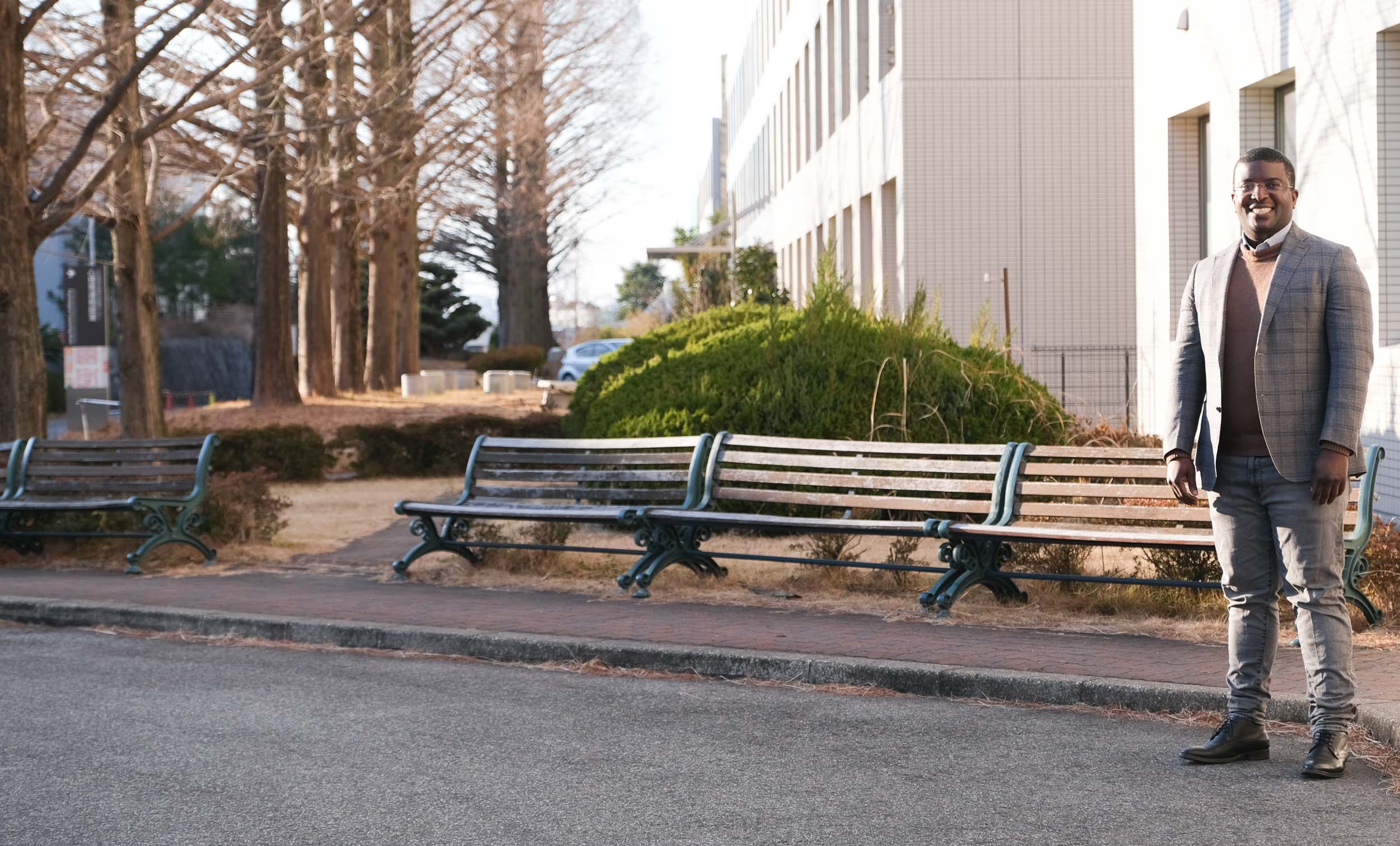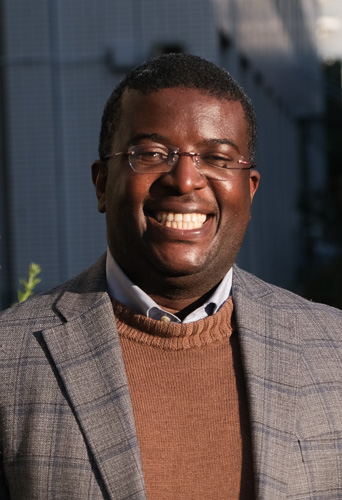・What is your research interest?
My research specialty is Economics. I studied econometrics in Congo. There, I researched the statistics and mathematical models. After I joined the Graduate School of International Development (GSID) at Nagoya University, I studied development economics. The field of development is more related to human beings. For example, if the research goes well, it will improve someone’s life. I used to prefer mathematical and abstract methods before, but now I found myself more interested in the process of development itself, i.e. taking data, analyzing it then reporting and improving. Especially data analysis is rewarding for me.
・How did you get involved in the SKY project?
When I was a student, one of my research themes was “income”, how much people were paid and how much they studied for it. In my doctoral dissertation, I wrote “skills are important to earn a high salary,” but I didn’t make it clear about skills itself.
In economic studies, many people think skills are important, but they are mainly focusing on only educational background, and not specific skills. On the other hand, companies that have expanded into Africa are having trouble finding skilled people. They cannot find exactly what their problems are. Since people in companies or employers don’t know how to measure the skills, they cannot hire their employees properly. So I wanted to build the bridge. Around that time, Prof. Yamada approached me and said, “I am working on a project called SKY on the theme of skills” and I gladly offered to do it.
・What was your first thing you did in the SKY project?
We started from discussing about what are the skills, how to measure them, and decided to create a questionnaire to evaluate the skills. It was really tough because there was no prior research to refer to, so we got input from a variety of sources including not only researchers but also experts from companies to make it. The first survey actually using it was also difficult. We targeted the Ethiopian sewing industry. It was the first time for us to research in Ethiopia. Although we prepared for the survey, many people suddenly didn’t show up. We called them and got respond like “we are busy” or “we had received a new order just now”.
・It sounds like there are many difficulties to do research on the field.
Yes, but it is quite enjoyable to go out into the field and take data by myself. When I analyzed the survey, I found that educational background had no impact on incomes, but soft skills – cooperation, honesty, and time management skills – had a tremendous impact. When I reported the results to the companies, the factory manager agreed “It’s true that our employees are often late” “Everyone chats during work”. It was interesting. I looked for the prior research and found some on soft skills, but none focused on Africa, so I decided to focus on soft skills in my SKY project.
・So, the field research set the direction for the project, doesn’t it
In economic research, it’s often common that we download and use survey data from the internet, but the SKY project gives me chances to go to the field. I can think by myself, do my own research, and shape my own ideas. Furthermore, SKY project has a link to government policy. Early stage of the SKY project in Ethiopia was able to be progressed because our project matched the government’s agenda. I had chances not only for writing papers, but also hearing issues and policies from the government, furthermore giving them my opinions as a researcher.
I believe how important the research is how it can impact on others. The best part is that someone can actually use it. The government may be seeking your research as well!
・Any impressive experiences working with a government?
The process of “reporting” was interesting. When we are young, we often want to show how we are good at analysis, especially new and cool one. One time, right before I was reporting to the government, Prof. Yamada looked my presentation and said “Your analysis is good, but what is your message? The government may not understand this”. I was confident in my analysis and my speech, but that was not enough. It was valuable for me to have this perspective at a young age: what is the message of the research, and how do I translate that message into policy making.
・Do you still continue working with government?
Every time we reported, one issue after another came up, and the project evolved like “let’s do next study”. In Ethiopia, the minister appreciated our project and let us to hold a symposium with government officials and experts. After that, we held another symposium in Tokyo. Prof. Yamada and I were also invited to symposium organized by the German International Cooperation Agency (GIZ) and the Ethiopian government. We received the reputation as “When it comes to skills in Ethiopia, it is the SKY project”. Even now, the government asks me for advice. Though Ethiopia is not my country, the government invite me for speech on a big stage, I feel I’ve made myself an expert (laughs). Anyway, I think it is a great achievement for me.
■About activities at SKY
・How was your research activity at SKY?
We were able to use a room in Nagoya University, so every day I worked with Dr. Taniguchi and Dr. Shimazu for preparing surveys, analyzing, reviewing, and discussing about “what skills are”. They both specialize in pedagogy, but also understand statistics, it was easy to talk with them as experts.
After the initial survey in Ethiopia, we brought what we could do each other to reconstruct the questionnaire. For example, Dr. Shimazu organized the skills , and Dr. Taniguchi did the necessary analysis.
・How was working with researchers from various fields?
At first, I thought it would be difficult to work together because our fields and methods were all different, but in SKY project, the other members helped me where I could not do by myself and vice versa. We all shared our opinions, asked each other who were good at which parts of research. When I couldn’t go to the field, someone covered for me. We discussed together to fix issues. The best thing in SKY project was that we shared the workload and worked as a team. I especially feel this when I see our result questionnaire. It becomes exciting one because we created it based on each one’s interest, my soft skills questions, Dr. Taniguchi’s math questions, Prof. Yamada’s teaching method questions, and some questions are for students, some for teachers. Though it took a long and hard time to shape, this is the product of our team. It’s created with everyone’s input, and I believe everyone enjoyed making it together.
・It seems the team has a good atmosphere.
I was looking forward the meetings. I had the pleasure of contributing to the project and learning from the members. Thanks to many hearing about education at those days, now I can talk with experts of education, sometimes people misunderstand I’m an expert of education. When I am talking with people from other fields, it’s interesting to think about what we can do together.
Prof. Yamada, the leader of the project, always gave the direction of the project, but she never said either “do it” nor “how to do it”, we all thought how to do it together, and she just said “What do you think? OK, I see, You can do it” (laughs). Prof.. Yamada is very good at creating an environment where ideas can come out and nurturing researchers and teams.
■ Future of SKY project
・What is the next challenge of the SKY project?
How to learn soft skills. Prior research shows two opposite positions: “soft skills can be learned after adulthood” and “it cannot be learned after adulthood “. In our research, we found that there is a difference in soft skills depending on whether they have attended TVET or JICA’s Kaizen Program or not, in other words, soft skills can be learned even after adulthood. Then, how can we teach them? From there, we decided to create a board game. The next step is to see if the game can increase income.
・It will show that one’s livelihood is improved by learning soft skills.
To make that happen, system which increase income by learning soft skills is important. There are many women in the Ethiopian sewing industry, but when men enter the company, they are promoted first, even if they are less skilled. This is because of cultural discrimination against women in the Ethiopian context, and the women themselves are not willing to move up because they have the mindset that they are only going to do sewing machine work.
The same thing can be said about soft skills. If communication skills are improved but income is not increased, training leads little result. We need to change culturally constrained thinking, and we need to provide the impetus to do so. For example, when foreign companies come to an industrial park, they promote talented women as managers, which is a game changer. The World Bank is also trying to promote role models for women’s success through videos. As for the game, if women can have the experience of being a hero in it, they may be able to change their mentality and say, “I may as well aim for the top”.
・Are country and cultural differences relevant to soft skills?
A manager of an international company with a branch office in Vietnam says, “Apparently, Ethiopia has low productivity” .even though they have the same equipment and manager. I have an idea to check whether soft skills is the cause of it or not, by doing a survey in the Vietnam and comparing it with Ethiopian results.
The initial SKY project focused on Africa, but we thought it would expand beyond it. Now we have a tool that can be used universally, it would be interesting to compare results in multiple countries. Now we have researchers from the Philippines and Thailand in our team, I think this is a very good direction.
・Please give a message to the researchers who are going to participate in the project.
There were many paths for us. Soft skills, mathematics, English, and many other paths, but after initial research and analysis, we found the soft skills path.
Since SKY is a “project,” we find one challenge after another, and I hope that new members will join us to lead the project to the next level.
The interesting thing of the SKY project is doing two things simultaneously, what the project requires from us and what we want to do in the project. The SKY project has the spirit like, we each have our own ideas, so let’s listen to each other’s opinions, think how to do, and work together. I hope new researcher to pursue their own research with SKY project team.




